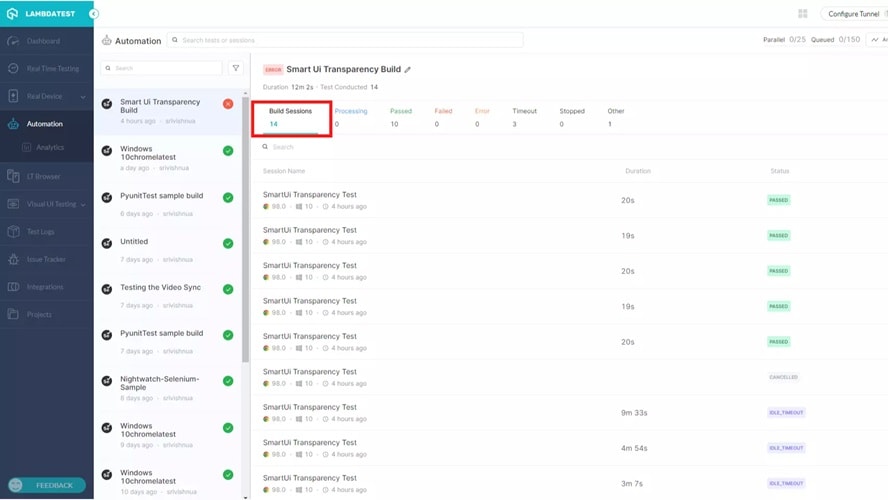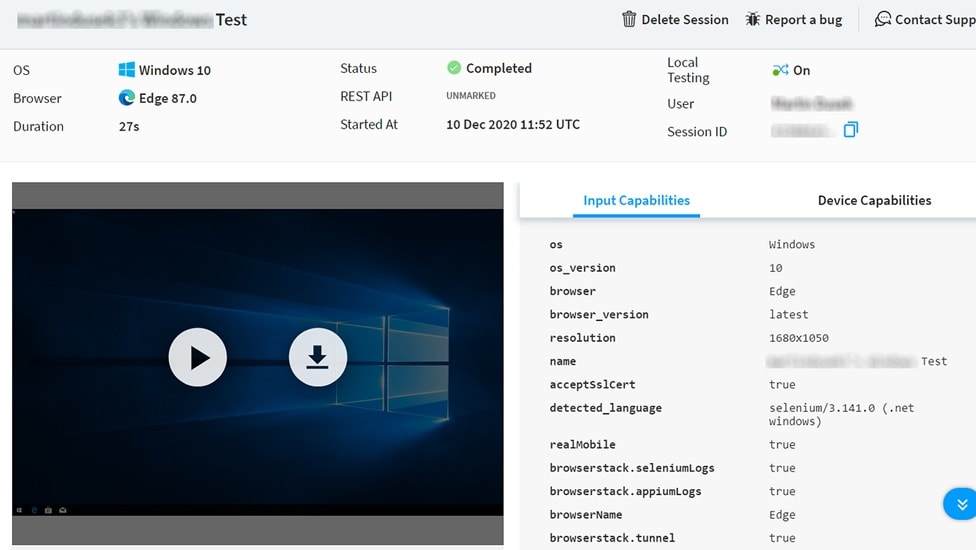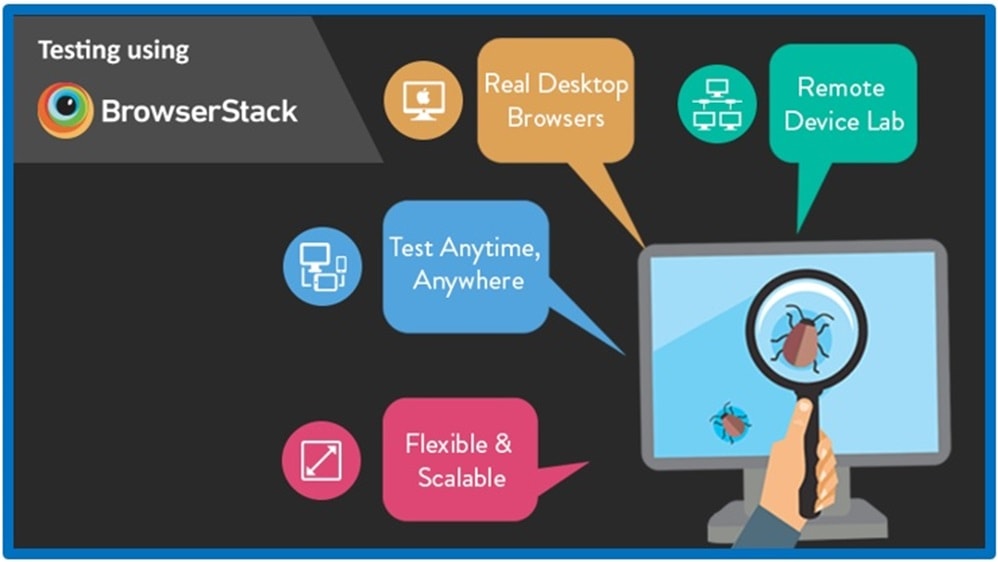LambdaTest vs BrowserStack: Choosing the right cross-browser testing platform
- 01LambdaTest vs Browserstack: overview
- 02What's the difference between LambdaTest and Browserstack?
- 03LambdaTest pros and cons
- 04Browserstack pros and cons
- 05LambdaTest compared to Browserstack
- 06Browserstack compared to LambdaTest
- 07Features comparison
- 08LambdaTest vs Browserstack: Which is the best for your business?
- 09Promotions on Web Development software
- 10Alternatives to LambdaTest & Browserstack
Save up to $568 on LambdaTest
Save up to $568 on LambdaTest
Cross-browser testing tools are essential for ensuring that your web applications function flawlessly across different browsers and devices. With a multitude of options available, selecting the right tool for your testing needs can be a daunting task. In this comparison, we take a closer look at two leading solutions: LambdaTest and BrowserStack.
LambdaTest and BrowserStack offer robust platforms designed to streamline your cross-browser testing process. By examining their features, performance, and usability, we aim to provide you with valuable insights to make an informed decision.
LambdaTest vs Browserstack: overview
LambdaTest and BrowserStack are prominent contenders in the realm of cross-browser testing platforms, each offering unique features and functionalities tailored to suit different testing needs.
LambdaTest prides itself on its comprehensive set of testing tools and features, providing developers and QA professionals with a versatile platform for conducting cross-browser and cross-device testing. With its intuitive interface and extensive browser and device coverage, LambdaTest simplifies the testing process and ensures seamless compatibility across various environments. On the other hand, BrowserStack is known for its robust infrastructure and scalable testing solutions. With a focus on performance and reliability, BrowserStack empowers teams to conduct efficient testing across a wide range of browsers, devices, and operating systems.
Now, let's delve deeper into the LambdaTest vs. BrowserStack comparison to help you determine the ideal testing platform for your specific requirements and workflows.
What's the difference between LambdaTest and Browserstack?


One of the primary distinctions between LambdaTest and BrowserStack lies in their pricing structures. While LambdaTest provides flexible pricing options starting at a lower entry point, BrowserStack tends to be positioned as the premium solution with higher starting prices. LambdaTest offers plans starting from $19 per month for its basic package, catering to the needs of startups and small teams, and scales up to higher-tier plans. In contrast, BrowserStack's pricing starts at $29 per month, reflecting its premium positioning in the market. Despite the variance in pricing, both platforms offer competitive features and capabilities to streamline cross-browser testing processes effectively.
Another notable difference between LambdaTest and BrowserStack is in their scope of integrations and third-party tool support. LambdaTest offers a wide array of integrations with popular development and project management tools such as Jira, Slack, GitHub, and more. This extensive integration ecosystem enhances workflow efficiency and collaboration for teams using LambdaTest. On the other hand, BrowserStack also provides robust integration options but with a narrower focus, catering to specific developer tools and platforms.
Additionally, the level of customer support and service differs between LambdaTest and BrowserStack. LambdaTest is known for its responsive customer support team, offering timely assistance and resources to resolve issues and queries promptly. BrowserStack, as a premium service, provides dedicated support channels and personalized assistance to its customers, ensuring a high level of satisfaction and reliability.
LambdaTest pros and cons
What are the advantages of LambdaTest?
- Comprehensive browser and device coverage: LambdaTest offers a wide range of browsers and operating systems, including desktop and mobile platforms, ensuring thorough cross-browser testing coverage.
- Scalability: With its cloud-based infrastructure, LambdaTest allows users to scale their testing efforts effortlessly, accommodating projects of any size or complexity.
- Collaboration features: LambdaTest facilitates team collaboration through features like real-time testing, screenshot sharing, and issue tracking, enhancing communication and productivity among team members.
- Integrations: LambdaTest seamlessly integrates with popular development and project management tools such as Jira, Slack, GitHub, and more, enabling streamlined workflows and enhanced efficiency.
- Affordable pricing: LambdaTest offers competitive pricing plans with flexible options, making it accessible to businesses of all sizes, including startups and small teams.
What are the disadvantages of LambdaTest?
- Limited test automation capabilities: While LambdaTest supports automated testing, its capabilities may not be as robust or advanced compared to dedicated test automation tools, limiting automation possibilities for complex scenarios.
- Learning curve: For users new to cross-browser testing or cloud-based platforms, LambdaTest may have a learning curve associated with understanding its features and functionalities fully.
- Performance issues: Occasionally, users may experience performance issues or latency due to the reliance on internet connectivity and server response times, impacting testing efficiency.
- Lack of advanced reporting: LambdaTest provides basic reporting and analytics capabilities, but users may find the absence of advanced reporting features or detailed insights limiting for comprehensive test analysis.
- Customer support: While LambdaTest offers responsive customer support, some users may find the level of support provided to be insufficient for addressing complex technical issues or queries in a timely manner.
Browserstack pros and cons
What are the advantages of Browserstack?
- Extensive browser and device coverage: BrowserStack offers a vast array of browsers, browser versions, and operating systems, ensuring comprehensive cross-browser and cross-device testing capabilities.
- Advanced test automation: BrowserStack provides robust automation tools and frameworks, including Selenium and Appium, empowering users to automate complex test scenarios efficiently.
- Real device testing: With access to real devices, including smartphones and tablets, BrowserStack enables thorough testing of mobile applications across various devices and configurations.
- Integrations and developer tools: BrowserStack seamlessly integrates with popular development and testing tools such as Jira, Jenkins, GitHub, and more, facilitating streamlined workflows and enhanced productivity.
- Dedicated customer support: BrowserStack offers dedicated customer support channels, including live chat, email support, and comprehensive documentation, ensuring prompt assistance and resolution of issues.
What are the disadvantages of Browserstack?
- Higher pricing: Compared to some other testing platforms, BrowserStack tends to have higher pricing tiers, which may be prohibitive for smaller teams or startups with limited budgets.
- Complexity for beginners: The wide range of features and advanced functionalities offered by BrowserStack may present a steep learning curve for users new to cross-browser testing or test automation.
- Occasional performance issues: Users may encounter occasional performance issues or latency, particularly during peak usage periods, which can affect testing efficiency and productivity.
- Limited free plan: While BrowserStack offers a free trial, its free plan has limitations in terms of features and testing capabilities, restricting access to certain functionalities for users on a tight budget.
- Dependency on internet connectivity: BrowserStack's cloud-based infrastructure relies on internet connectivity, which may pose challenges for users in areas with unreliable or slow internet connections, impacting testing reliability and efficiency.
LambdaTest compared to Browserstack
LambdaTest and BrowserStack are both leading cross-browser testing platforms, each with its own set of strengths. LambdaTest offers competitive pricing plans, extensive browser and device coverage, and seamless integrations with popular development tools.
However, BrowserStack stands out with its advanced test automation capabilities, real device testing options, and dedicated customer support channels. While LambdaTest may appeal to budget-conscious users seeking a user-friendly testing solution, BrowserStack caters to those requiring more sophisticated automation and comprehensive testing capabilities.
Is LambdaTest better than Browserstack?
Choosing between LambdaTest and BrowserStack for cross-browser testing involves evaluating specific needs and preferences. LambdaTest attracts users with its cost-effectiveness and broad compatibility across browsers and devices, complemented by its easy integration into the development workflow. This makes it a compelling option for teams looking to maximize their testing capabilities without significantly increasing costs.
On the other hand, BrowserStack differentiates itself with its superior automation features and the ability to test on real devices, providing an edge for projects where accuracy and depth of testing are paramount. Moreover, its robust customer support ensures a smoother testing experience, making it ideal for enterprises and professionals who prioritize support and advanced testing functionalities.
What is LambdaTest best used for?
LambdaTest is best used for conducting thorough cross-browser testing of web applications. It offers a wide range of browsers, operating systems, and devices for comprehensive testing coverage. With its intuitive interface and robust testing features, LambdaTest simplifies the testing process and ensures seamless compatibility across different browser environments. It is particularly beneficial for developers, QA professionals, and testing teams looking to identify and resolve compatibility issues efficiently.
Additionally, LambdaTest facilitates collaboration through real-time testing, screenshot sharing, and issue tracking, enhancing communication and productivity among team members. Overall, LambdaTest is an invaluable tool for ensuring the quality and performance of web applications across various platforms.
Can LambdaTest replace Browserstack?
While LambdaTest offers robust cross-browser testing capabilities, it may not entirely replace BrowserStack for all users. BrowserStack provides advanced automation tools, real device testing, and dedicated customer support, which may be crucial for certain projects or teams.
Additionally, BrowserStack's extensive browser and device coverage, along with its comprehensive testing features, make it a preferred choice for many developers and QA professionals. However, LambdaTest can serve as a viable alternative for users seeking a more budget-friendly option with flexible pricing plans and seamless integrations. Ultimately, the decision to replace BrowserStack with LambdaTest depends on individual requirements and preferences.
Is LambdaTest cheaper than Browserstack?
LambdaTest typically offers more budget-friendly pricing options compared to BrowserStack. While both platforms provide comprehensive cross-browser testing solutions, LambdaTest's pricing plans start at a lower entry point, making it a more cost-effective option for users with limited budgets or smaller testing requirements.
Additionally, LambdaTest offers flexible pricing plans with various features and capabilities to accommodate different user needs, allowing users to scale their testing efforts without breaking the bank. However, it's essential to consider the specific features, functionalities, and support options offered by each platform when evaluating their overall value proposition and determining the most suitable solution for your testing needs.
Is there a better Web Development software than LambdaTest?
When considering cross-browser testing tools, it's essential to evaluate whether there might be a better alternative than LambdaTest for your specific testing needs.
Some notable alternatives to LambdaTest in the cross-browser testing space include BrowserStack, Sauce Labs, CrossBrowserTesting, Testrail and TestComplete by SmartBear.
The choice of cross-browser testing tool depends on factors such as testing requirements, project complexity, budget constraints, and team preferences. While LambdaTest offers a robust platform with comprehensive browser and device coverage, other tools may offer unique features, advanced automation capabilities, or specialized testing environments that better align with your testing objectives.
30% off any annual subscription plan on LambdaTest
Get 30% off any annual subscription plan on LambdaTest and up to $568 savings with Secret.
Browserstack compared to LambdaTest
BrowserStack and LambdaTest are leading cross-browser testing platforms, each offering distinct advantages. BrowserStack stands out with its extensive browser and device coverage, advanced automation capabilities, and real device testing options. It provides comprehensive testing solutions tailored to meet the diverse needs of developers and QA professionals.
In contrast, LambdaTest offers competitive pricing plans, seamless integrations, and collaboration features, making it an attractive option for budget-conscious teams.
Is Browserstack better than LambdaTest?
Deciding whether BrowserStack is superior to LambdaTest hinges on the specific requirements and priorities of the development team. BrowserStack shines in scenarios where the depth and breadth of testing are critical, thanks to its unparalleled access to a wide range of browsers and real devices, coupled with its sophisticated automation tools. This makes it the go-to choice for teams that need to conduct thorough testing across various environments, ensuring their applications perform flawlessly on any platform.
While LambdaTest is favored for its affordability and collaborative features, BrowserStack is preferred by those seeking exhaustive testing capabilities and the assurance that comes with testing on actual devices, providing a more accurate representation of user interactions.
What is Browserstack best used for?
BrowserStack is best used for conducting comprehensive cross-browser testing of web applications. With its extensive browser and device coverage, including real devices, BrowserStack ensures thorough testing across various platforms and configurations. It is particularly beneficial for developers and QA professionals seeking to identify and resolve compatibility issues efficiently.
BrowserStack's advanced automation capabilities, seamless integrations with popular development tools, and dedicated customer support make it an invaluable resource for streamlining the testing process and ensuring the quality and performance of web applications across different browsers, operating systems, and devices.
Can Browserstack replace LambdaTest?
While BrowserStack offers robust cross-browser testing capabilities, it may not entirely replace LambdaTest for all users. BrowserStack provides advanced automation tools, real device testing, and extensive browser and device coverage, making it a preferred choice for many developers and QA professionals.
However, LambdaTest offers competitive pricing plans, flexible integrations, and collaboration features that appeal to budget-conscious teams. Whether BrowserStack can replace LambdaTest depends on individual requirements, project complexity, and budget considerations.
Is Browserstack cheaper than LambdaTest?
Determining whether BrowserStack is cheaper than LambdaTest depends on various factors such as the specific needs of your project, desired features, and usage requirements. While both platforms offer competitive pricing plans, LambdaTest typically provides more budget-friendly options with lower entry points.
However, the overall cost-effectiveness varies depending on factors like the number of users, testing frequency, and required features. It's essential to carefully evaluate the pricing structures, features, and support options of both BrowserStack and LambdaTest to determine which platform offers the best value for your cross-browser testing needs while aligning with your budget constraints.
Is there a better Web Development software than Browserstack?
When evaluating cross-browser testing tools, it's crucial to determine whether there might be a better alternative than BrowserStack for your specific testing requirements.
Some notable alternatives to BrowserStack in the cross-browser testing space include LambdaTest, Datadog, SmartBear, BitBar, and Appium.
The choice of cross-browser testing software hinges on factors such as testing needs, project complexity, budget limitations, and team preferences. While BrowserStack provides a comprehensive suite of testing solutions with extensive browser and device coverage, other tools may offer unique features, advanced automation capabilities, or specialized testing environments better suited to your testing objectives.
Features comparison
BrowserStack's Superior Usability Outshines LambdaTest

When comparing the ease-of-use of LambdaTest and BrowserStack, BrowserStack takes the lead. For instance, BrowserStack offers a seamless testing experience with its simplified navigation and clearly labeled options, making it easier for users to navigate through the platform and access essential testing functionalities.
In contrast, while LambdaTest provides robust testing capabilities, some users may find its interface slightly more complex to navigate, resulting in a steeper learning curve. Overall, BrowserStack's superior usability enhances user satisfaction and productivity, positioning it as the preferred choice for seamless cross-browser testing experiences.
LambdaTest and BrowserStack are Equally Proficient in Automated Testing

Both LambdaTest and BrowserStack excel in offering automated testing capabilities to enhance productivity and efficiency in the testing process. LambdaTest allows users to automate tests, significantly saving valuable time by executing repetitive testing tasks automatically. Similarly, BrowserStack provides users with robust automated testing features alongside real-time debugging functionalities.
For instance, users can automate test scripts to run across multiple browsers and devices, ensuring comprehensive test coverage without manual intervention. In this aspect, both LambdaTest and BrowserStack effectively streamline testing workflows and eliminate the need for manual testing, ultimately empowering teams to focus on higher-value tasks.
LambdaTest Surpasses BrowserStack in Browser and OS Compatibility

While both LambdaTest and BrowserStack provide versatility in terms of device compatibility, LambdaTest boasts testing compatibility across over 2000 browser and operating system configurations, ensuring comprehensive coverage for cross-browser testing scenarios. For instance, developers can test their web applications across a wide range of browsers, including Chrome, Firefox, Safari, and Edge, on various operating systems such as Windows, macOS, iOS, and Android.
In contrast, while BrowserStack offers a real device cloud for testing on over 2000 devices and browsers, it doesn't explicitly state its support for various operating systems. Therefore, LambdaTest holds a clear advantage in this criterion of cross-browser testing platforms.
BrowserStack Leads in Integration Versatility Over LambdaTest

In terms of integration capabilities, both LambdaTest and BrowserStack offer extensive options. However, BrowserStack stands out for its wider range of integrations, providing users with more flexibility and versatility in their testing workflows. For instance, BrowserStack seamlessly integrates with tools like Jenkins, TeamCity, and CircleCI, allowing for seamless automation and streamlined testing processes.
In contrast, while LambdaTest also offers robust integration capabilities, its selection may be slightly narrower in comparison. Therefore, for users seeking extensive integration options, BrowserStack proves to be the superior choice.
LambdaTest's Simultaneous Cross-Browser Testing Triumphs Over BrowserStack

When comparing the real-time testing capabilities of LambdaTest and BrowserStack, LambdaTest emerges as the superior choice for simultaneous, cross-browser and cross-device testing. LambdaTest empowers users with the ability to test their websites across multiple browsers and devices concurrently, significantly saving time and enhancing efficiency. For example, users can perform tests on various combinations of browsers, operating systems, and devices simultaneously, ensuring thorough compatibility checks.
In contrast, while BrowserStack offers real-time debugging features, it lacks the same level of simultaneous testing capabilities as LambdaTest. Therefore, LambdaTest's advanced functionality provides users with a distinct advantage in the realm of cross-browser testing.
LambdaTest's Geolocation Testing Versatility Surpasses BrowserStack

LambdaTest distinguishes itself with its geolocation testing feature, allowing developers to verify their websites' accessibility and localization accuracy worldwide. This capability ensures that websites function correctly and display localized content based on users' geographical locations. For example, developers can simulate user locations from different regions to assess how their websites perform and tailor content accordingly.
In contrast, while BrowserStack offers a diverse range of features, it lacks the specific geolocation testing functionality provided by LambdaTest. Therefore, LambdaTest emerges as the more versatile choice for users seeking comprehensive geolocation testing capabilities to ensure global website accessibility and localization accuracy.
BrowserStack's Cloud-Based Flexibility Surpasses LambdaTest

BrowserStack stands out as a cloud-based platform that enables developers to test applications from anywhere, giving it an edge over LambdaTest in terms of accessibility and flexibility. For example, developers can access BrowserStack's testing environments remotely, allowing for seamless collaboration and testing across distributed teams.
While LambdaTest offers an extensive array of testing features, it doesn't prioritize cloud-based support to the same extent as BrowserStack. Consequently, BrowserStack emerges as the preferred choice for teams seeking flexible, location-independent testing options, making it a stronger contender in this aspect of cross-browser testing platforms.
Subscribe to our newsletters.
No FOMO here. Stay up-to-date on all the latest deals and news with our monthly newsletter straight to your inbox like 112,000+ entrepreneurs (+ Get 10% off on on our Premium Membership!)
LambdaTest vs Browserstack: Which is the best for your business?
LambdaTest is the best tool for you if:
- You're looking for an affordable yet powerful cross-browser testing solution, with pricing plans that cater to startups and small teams without compromising on essential testing functionalities.
- Seamless integration with your existing CI/CD pipelines and collaboration tools is a priority, enabling your development and QA teams to streamline their workflows and improve efficiency.
- Your project demands comprehensive browser and OS coverage but must stay within a tight budget, offering access to a vast array of testing environments without the premium cost.
- You value user-friendly interfaces and straightforward test setup processes, making it easier for new team members to get up to speed and contribute to testing efforts quickly.
- Collaboration and team coordination are at the heart of your testing strategy, with features that support easy sharing of test results, bug reporting, and communication within the platform.
Browserstack is the best tool for you if:
- Advanced automation capabilities are crucial for your testing strategy, offering sophisticated tools that enable efficient scripting and execution of automated tests across multiple devices and browsers.
- Real device testing is a non-negotiable requirement, providing access to an extensive inventory of real smartphones and tablets for accurate testing outcomes that simulate real-world user experiences.
- Your project demands the highest level of testing accuracy and depth, with BrowserStack's extensive browser and device coverage ensuring your application performs flawlessly across all platforms.
- Dedicated customer support and professional guidance are essential to your team, ensuring quick resolution of issues and expert advice to optimize your testing processes and workflows.
- Integration with a wide range of development tools and CI/CD pipelines is critical, facilitating seamless workflows and enabling your team to maintain high productivity and efficiency in your development cycle.
Alternatives to LambdaTest & Browserstack
Promotions on Web Development software
Start saving on the best SaaS with Secret.
Secret has already helped tens of thousands of startups save millions on the best SaaS like LambdaTest, Browserstack & many more. Join Secret now to buy software the smart way.







